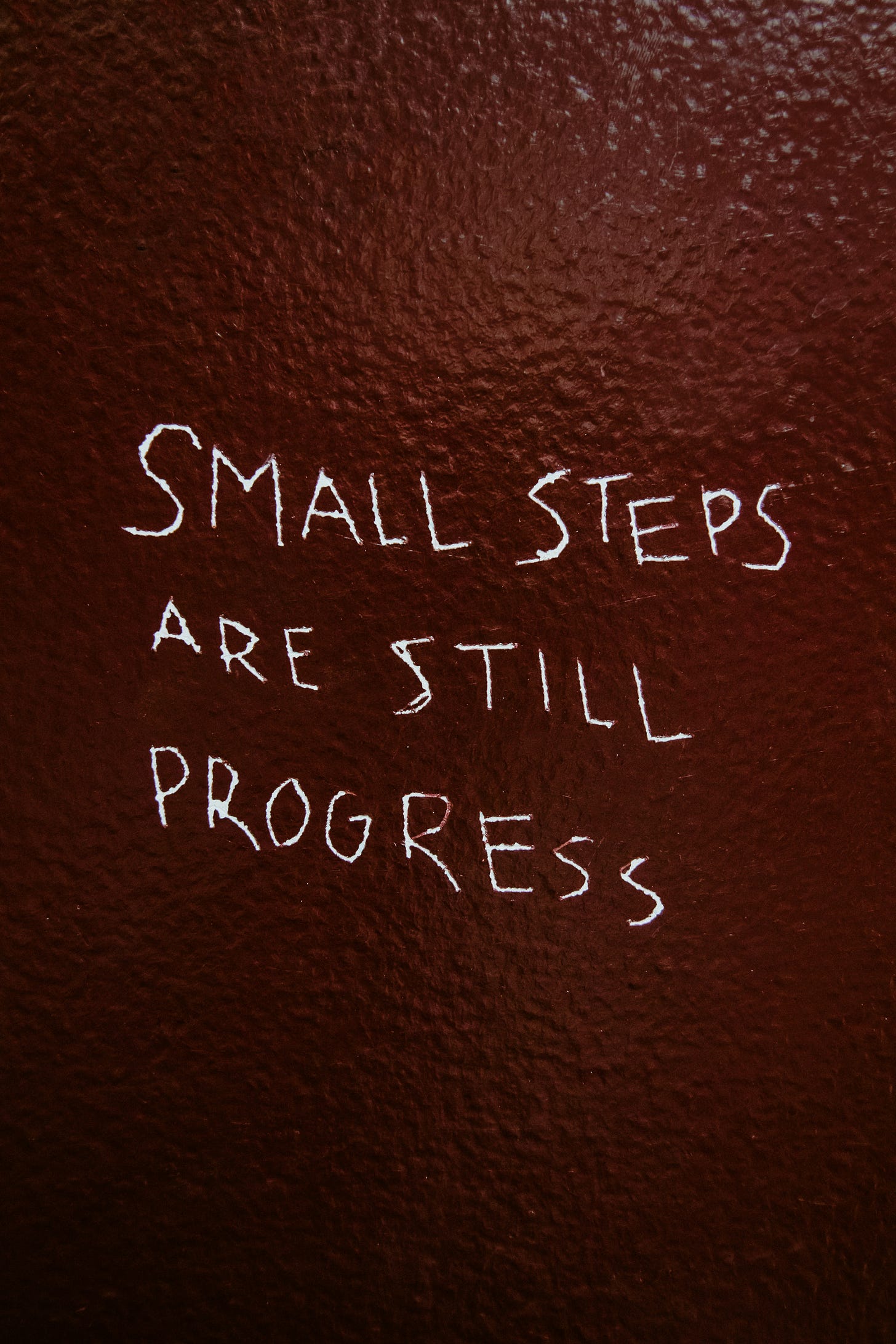In my last post, I introduced to you to the world of Alcoholics Anonymous and hopefully de-bunked some of the myths around the organisation. Today, I’m exploring one of the keystones of the AA, its 12 steps. Here’s what it’s all about…
STEP ONE: HONESTY
We admitted we were powerless over alcohol — that our lives had become unmanageable.
Addiction causes denial. However much a loved one wants the addict to go into recovery, unless they can accept they have a problem and decide for themselves to stop drinking alcohol, changes will never stick. Members of the fellowship will work on this step many times, after a relapse or simply to remind themselves that they’ll always be powerless over alcohol. Completing this step can look like speaking at an AA meeting, telling someone if you feel like drinking or do drink, working with a therapist or getting an AA sponsor.
STEP TWO: FAITH
We came to be aware that a power greater than ourselves could restore us to sanity.
This step can be challenging as it appears to encourage people to believe in God and those who don’t have a faith struggle to get their heads round it. But this step isn’t really about God. You are asked if you can accept that there is a higher power, something bigger than yourself that you can rely on. This could be God, or it could be a universal power or the power of friendship, of the group. The idea behind this is that if you can find a higher power to turn to, it might help you see life from a different perspective and to be more accountable for your actions.
STEP THREE: SURRENDER
Made a decision to turn our will and our lives over to the care of God as we understood Him.
The wording of this step isn’t helpful for those who aren’t religious. But it’s not meant to be a religious obligation. It’s about finding a way to rely on others, rather than trying to do recovery by yourself, on your own terms. This step encourages people to embrace some kind of spiritual growth, to understand the difference between what is in and outside of your control. You are encouraged to be humbler and more open to making changes, and to have more accountability for the things you do have control over.
STEP FOUR: SOUL SEARCHING
Made a searching and fearless moral inventory of ourselves.
This is one of the biggies. It asks you to do a full assessment of exactly who you are. This forces you to look at your past and your present. You will be asked to look at issues you might have around fear, resentment, anger, pride, guilt, shame, self-pity, secrets, relationships. The idea behind this is to get a clear idea of how your behaviour has affected you and the people around you. Your sponsor will probably suggest you write this down as the act of writing can help solidify what you’re thinking. And it’s important you work this stuff out. There are AA workbooks to help you through it.
STEP FIVE: INTEGRITY
Admitted to God, to ourselves, and to another human being the exact nature of our wrongs.
This is another important step and one that will take time and should take time. People can be afraid at the start of this step. Fear is a common response to confession, it’s important you talk it out with your sponsor and your therapist if you have one. I won’t lie, this step can be gut-wrenching (hence me saying this one takes time). But the point of this step is not to shame you but to help you get rid of all that baggage and those secrets you have been hiding inside of you. This is about acknowledging your struggles and the harm your addictive behaviour and your drinking has caused to others.
STEP SIX: ACCEPTANCE
Were entirely ready to have God remove all these defects of character.
By the time people get to this stage, they have already done a lot of hard work acknowledging and admitting their difficulties. Step six builds on all of that. This step is about attitude, not action. It focuses on the willingness to change all those old behaviours that contributed to you developing such a serious problem with alcohol. And it’s not a one-time thing, this is a step you have to keep coming back to. They key here is to be really specific about some of the character faults that may have contributed to the onset and development of an alcohol use disorder. And don’t forget, the God mentioned doesn’t have to be the Christian God. It can be whatever higher power you have identified in step two.
STEP SEVEN: HUMILITY
Humbly asked Him to remove our shortcomings.
This step is all about humility. It’s a challenging step, but one that can lead to lasting rewards. The hope is that this step will help you change the attitudes you have that have contributed to your drinking. This step encourages people to drop their defensiveness, the blame, and excuses that they have used in the past to justify their drinking. There is a particular prayer that is suggested...
My Creator,
I am now willing that you should have all of me, good and bad.
I pray that you now remove from me every single defect of character
which stands in the way of my usefulness to you
and my fellows.
Grant me strength, as I go out from here, to do your bidding.
Amen.
STEP EIGHT: WILLINGNESS
Made a list of all persons we had harmed and became willing to make amends to them all.
Another biggie here. This step tells you to write a note all the people that you have hurt in some way and come to a place where you are willing to apologise and rewrite your wrongs. It’s a tough step to complete because you must look honestly and openly at just how much your drinking impacted the people in your world. This isn’t a tick-box exercise. With the help of others and some tough contemplation and prayer (if you’re that way inclined) you must come to a place where you are honestly willing to apologise. A word of caution here: some people find that their self-destructive thoughts increase, and they begin to crave alcohol as they are forced to face some negative thoughts and feelings that initially caused them to drink. This is where your sponsor can help and why it’s so important not to go through these steps alone.
STEP NINE: FORGIVENESS
Made direct amends to such people wherever possible, except when to do so would injure them or others.
This step follows on directly from Step 8 and asks you to let go of the resentment and hurt that you might feel towards others and turn your attention to correcting the mistakes you might have make or the bad situations you have caused in the past. It’s easier said than done, for sure. But you can’t shy away from taking action. You are encouraged to go to any lengths to make these amends (if doing so doesn’t cause more harm), even if you are then forced to face challenging consequences. The overriding principal behind this step is to make full amends at the earliest opportunity, if such action is feasible, proper, and sincere. Your sponsor may help you break down this task, so that you can identify the people you are able to make a complete amends to. There will be some people for whom this is only partially possible because harm could be caused. There will be people on the list who you should not make amends to until you have established a solid recovery, so that you don’t let them down and you don’t jeopardise your sobriety. And lastly, there will be some for whom you can’t make amends because they have died.
STEP TEN: MAINTENANCE
Continued to take personal inventory and when we were wrong promptly admitted it.
This step is all about learning to regularly check in with yourself. It involves self-reflection and teaches you to be honest with yourself about the progress that you’ve made, so that you can move forward. You learn to take personal responsibility for the mistakes you make and most importantly, it involves a commitment to promptly admitting when you are wrong. This isn’t about long explanations about why you’re wrong. It’s simply about identifying when you’re wrong and acknowledging it. Do this daily and it will help you maintain emotional sobriety and prevent that nasty build-up of resentments and unresolved issues that would have contributed to you drinking in the first place.
STEP ELEVEN: MAKING CONTACT
Sought through prayer and meditation to improve our conscious contact with God as we understood Him, praying only for knowledge of His will and the power to carry that out.
This step can throw some people, because of the reference to God. But what it is actually asking is that you find a source of inspiration (which could be God but doesn’t have to be) and use it to help you find the strength to stay on this path of recovery. There is no official spiritual path in AA. Whether you have a solid faith, or your mind is not made up, it doesn’t matter. All this step asks is that you keep looking for a better way to understand the higher power that you have chosen. That can be done through prayer in a church, a 10-minute meditation on your bedroom floor or moments of silence in nature. There is no one right way to do this. However, this step does help us see that whatever spiritual path we choose needs to continue to align with the fellowship and its everyday practices.
STEP TWELVE: SERVICE
Having had a spiritual awakening as the result of these steps, we tried to carry this message to alcoholics, and to practice these principles in all our affairs.
This final step is all about helping others who are struggling with their drinking, so that they can gain sobriety. It can be challenging because it forces you to publicly acknowledge your difficulties with alcohol. This step is about taking action, doing service, helping, giving back. But it’s not all about others. Working step 12 reminds you of the early days of your recovery and why you’ve worked so hard to get to where you are. It gives you a sense of purpose, keeps you accountable and strengthens your fellowship with others. This step helps you prove to yourself that you are trustworthy.
There is no set time for you to go through the 12 steps. This process involves making amends to those who you may have hurt through your alcoholism. That can take a day or two. For others, much longer. The focus isn’t on time. This isn’t a race or a competition. There is no prize for doing it quickly. Instead, concentrate on making a difference in your life and in the lives of those who have been impacted by your addiction. That way, the commitment is to your sobriety and to a successful recovery, for your sake and for the benefit of those who love you.
Having spent hours reading about the rationale behind the steps and what it means to be able to complete them, I would be really interested to hear about your experience of attempting the steps. Let me know how you found it by posting a comment below.





